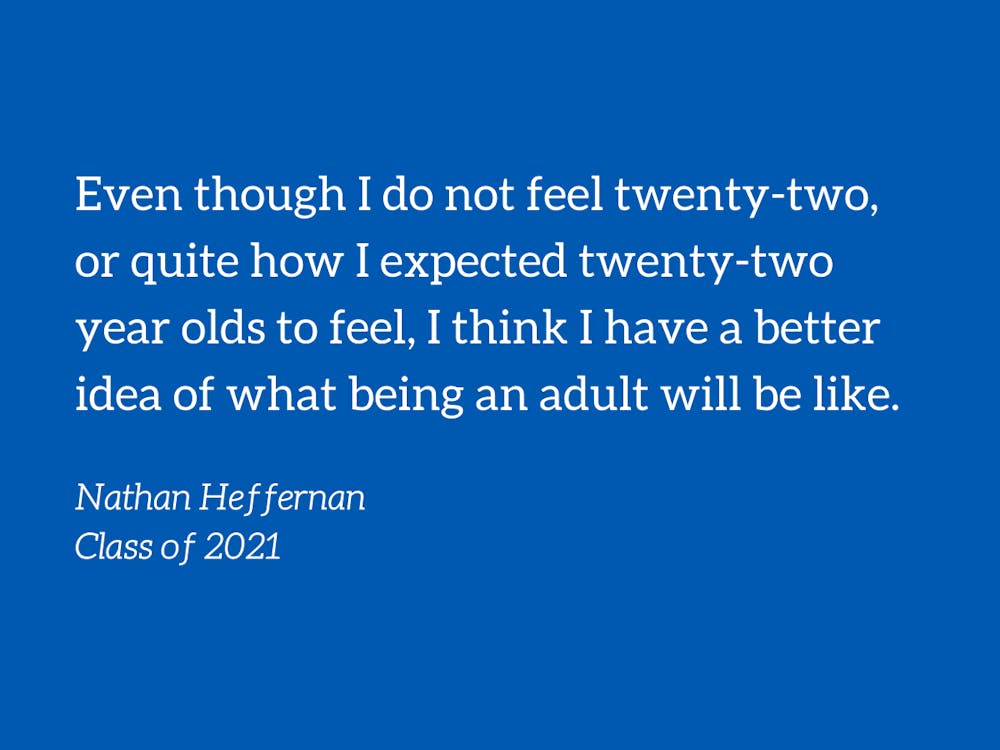“I don’t know about you/ but I’m feeling 22” - Taylor Swift, American singer/songwriter/voice of our generation.
In the last week of February 2021, I turned twenty-two years old. This marked my successful completion of being twenty-one, which, in the United States, is our true entrance to the “adult world.” Access to bars, clubs, rental cars, Chili’s margaritas—the possibilities are endless. However, my first year of being twenty-one was far from the experience I expected, marked more by DIY cocktails and movie nights than endless clubbing. Because of this I didn’t ever feel like I was twenty-one. My expectations of what being twenty-one, and what being an adult would feel like, fell short because of the pandemic. But maybe it was always destined to be a let-down.
It is well known that Duke students engage in the consumption of alcohol prior to their twenty-first birthday, and that this illicit practice is actually commonplace in colleges throughout the U.S. It is so commonplace in fact, that college is associated with binge drinking and crazy parties in U.S. media and film. This pattern is starkly different from most parts of the world, where the drinking age is eighteen, and sometimes the legal age for beer and wine is even earlier. College drinking starts all at once and informally, making it a recipe for unsustainable chaos. As a result, our relationship with alcohol, drugs and everything else teens are prohibited from doing is defined by their illegality and our youth identity.
Making a substance illegal is an interesting concept, and a policy decision that we currently take for granted. Certain drugs are illegal while their prescription counterparts wreak havoc across America. We are conditioned to view drugs as “good” or “bad” based purely on their legal status, leading to abuse of prescription drugs and a vicious carceral system. The basis of criminalizing drugs is one of paternalism, the idea that people are unable to make decisions regarding substances on their own. While addiction is a powerful disease, this perspective does not hold true for all substances, and a strong regulatory hand may do more damage than good.
For alcohol, currently it remains legal for adults over twenty-one, so the decision of paternalism is on children and teenagers, who are assumed to be unable to make the correct decisions. As a former teenager and current adult, I agree that teenagers often make bad decisions—in every aspect of our lives. But I disagree with the choice of twenty-one as the age of absolute maturity, and the assumption that age inherently allows someone to manage substances, and the rest of our lives, better. Turning twenty-one does not automatically make a person learn to “ride the wave” and drink responsibly, only education and experience can do that. And I am an advocate for hands-on learning.
Since most college students at least try alcohol before they are actually twenty-one, they are receiving experience. However, their exposures are limited to informal settings, less actual venues and more separate from larger society. Like other drugs, alcohol immediately becomes a “bad” substance, one that is taboo and only exists in the dark. Drinking underage can be more enticing for this reason, and when it exists as separate from regular life, it can manifest in binge drinking. The illegality of the action predisposes us to behave more immaturely with it.
When I studied abroad (have I mentioned that?), the first thing most of us noticed was how different we felt about alcohol when it was legal. We grabbed drinks on the plaza after most classes, and chatted as if we were adults at happy hour. It became a feature of socializing, and not the event itself. When we would go out at night, our focus was always on socializing, dancing and having fun with each other—only sometimes getting as drunk as college students typically would get. It made me appreciate nightlife more than I had before, and made me excited for my adult recreational life.
The United States model of alcohol consumption does a disservice to going out, as it gives so much importance to being “twenty-one.” It makes us feel like maturity will instantly come at once, just as the world of nightlife is opened up to us. After a year of being twenty-one without any of the perks, I see how silly my conceptions about my twenties and growing up were. I always assumed since I would be receiving more freedom, that I would be maturing at an appropriate rate as well. I realize now that I grow much more from experience than age, and that knowledge will not just be handed to me—but people start regarding me as more mature anyways.
Even though I do not feel twenty-two, or quite how I expected twenty-two year olds to feel, I think I have a better idea of what being an adult will be like. I will have more agency in the future, and my decisions will be more impactful and frequent. But this change is natural and gradual, and is not defined by strict checkpoints of age. For me, this makes getting older much less scary, as I feel less pressured to instantly evolve into a reformed version of myself. I am the same person who made stupid decisions in my teenage years, just with more experiences under my belt, still continuing to learn from my mistakes. So cheers to more of that.
Nathan Heffernan is a Trinity senior. His column runs on alternate Thursdays.
Get The Chronicle straight to your inbox
Sign up for our weekly newsletter. Cancel at any time.

